Global warming is a pressing issue that demands our immediate attention. It refers to the gradual increase in the Earth’s average surface temperature due to the buildup of greenhouse gases in the atmosphere. Understanding its causes is crucial for mitigating its effects and working toward a sustainable future.
One of the foremost contributors to global warming is the burning of fossil fuels. This practice releases significant amounts of carbon dioxide (CO2), a greenhouse gas that traps heat in the atmosphere. Fossil fuels such as coal, oil, and natural gas are the primary energy sources for many countries, fueling transportation, electricity production, and industrial processes. As these fuels combust, they emit vast quantities of CO2, exacerbating the greenhouse effect and leading to climate change. Furthermore, the increasing demand for energy in developing nations further intensifies this issue, making the transition to renewable energy sources essential.
Deforestation also plays a critical role in global warming. Trees and forests sequester carbon dioxide, absorbing this greenhouse gas from the atmosphere and storing it in their biomass. When forests are cleared for agriculture, urban development, or logging, not only is the carbon stored in trees released back into the atmosphere, but the planet loses a vital component for carbon absorption. Additionally, deforestation disrupts ecosystems, diminishes biodiversity, and alters local weather patterns, compounding the adverse effects of climate change.
Industrial activities present another significant driver of global warming. Manufacturing processes, chemical production, and waste management processes emit a variety of greenhouse gases, including methane (CH4) and nitrous oxide (N2O). Methane, which is produced during agricultural practices, landfill decomposition, and fossil fuel extraction, is particularly concerning due to its potency as a greenhouse gas—its heat-trapping ability is over 25 times greater than that of carbon dioxide over a 100-year period. The growing global population and increasing consumption levels lead industries to expand operations, subsequently elevating their carbon footprints.
Agriculture remains a substantial source of greenhouse gases. The sector not only contributes CO2 emissions through machinery and land-use changes, but also produces methane during enteric fermentation in ruminant animals and nitrous oxide from fertilizer application. As the world population continues to swell, so too does the demand for food, leading to intensified farming practices that can exacerbate climate change. Sustainable agricultural practices, such as integrated pest management and crop rotation, are essential for reducing these emissions and promoting environmental stewardship.
Transportation is also a major contributor to global warming. The reliance on fossil fuels for cars, trucks, planes, and ships results in significant emissions of carbon dioxide and other greenhouse gases. Vehicle emissions are exacerbated in urban areas, where traffic congestion leads to increased fuel consumption. Moreover, the aviation industry is an important yet often overlooked source of emissions, with flights releasing high quantities of greenhouse gases directly into the upper atmosphere, where their warming impact is magnified. Transitioning to electric vehicles, improving public transportation infrastructure, and exploring alternative fuels are critical for reducing transportation-related emissions.
Waste management is frequently underestimated as a catalyst of global warming. Landfills are a significant source of methane emissions due to organic waste decomposition. Inadequate recycling and waste disposal practices can perpetuate this cycle. By adopting comprehensive waste management strategies that prioritize reduction, reuse, and recycling, we can help minimize the greenhouse gases released from landfills. Innovative practices such as composting can not only help reduce methane emissions but also enrich soil, promoting a more sustainable agricultural system.
Climate change is also influenced by natural mechanisms, though human activity has substantially accelerated the process. Volcanic eruptions and solar radiation variations can contribute to short-term climate fluctuations. However, the current era of global warming is primarily driven by anthropogenic factors. Awareness and education about these natural elements can help contextualize the urgency of addressing human-induced climate change.
Ultimately, the fight against global warming requires collective efforts and innovative solutions. Policymakers must enact and enforce regulations aimed at reducing emissions and preserving natural ecosystems. Transitioning to renewable energy sources, such as wind, solar, and hydropower, presents a way forward. Additionally, enhancing energy efficiency measures in buildings and industries can substantially lower energy consumption and emissions.
Individuals also play a pivotal role in addressing global warming. Implementing sustainable practices in daily life, such as using public transportation, reducing energy consumption, and supporting local and organic products can make a notable difference. Advocacy and awareness campaigning are tools that can mobilize communities to act against climate change.
In conclusion, understanding the causes of global warming is essential for creating effective strategies to combat climate change. By recognizing the key contributors—from fossil fuels to deforestation, industrial activities, agriculture, transportation, and waste management—society can implement targeted actions aimed at mitigating these impacts. As individuals and communities unite in the effort to curtail global warming, we pave the way for a healthier planet future, ensuring it remains a thriving environment for generations to come.








